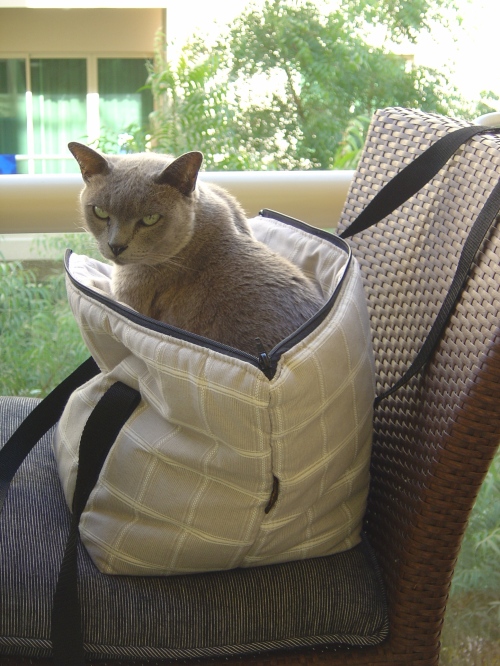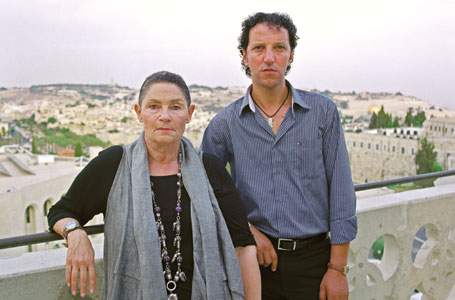
“It started by us both liking cigarettes, a lot!” Robi Damelin and Ali Abu Awwad, on the roof balcony of Notre-Dame de France hotel overlooking Jerusalem, lost a son and a brother respectively, and have used their loss to try to spread the word of peace. PHOTOGRAPH: MICHAL CHELBIN
Taken from The National
A Palestinian whose brother was shot in the head by an Israeli soldier. An Israeli mother who lost a son to a Palestinian sniper. Brought together by a bereavement group, with members from both sides of the conflict, they are now spreading a message of peace. ByRachel Shabi
Nobody could doubt the friendship between them. As they speak together in public they exchange ideas and support. On stage, he gives her hand a reassuring squeeze during tough moments. Her eyes sparkle with admiration as his powerful words generate ripples of applause throughout the audience. They share the headset for a simultaneous translation device – an earpiece each – when caught short. Robi Damelin and Ali Abu Awwad come across as close, trusting friends. But according to the political narrative of their region, they should be the worst of enemies.
Robi Damelin is a 65-year-old Israeli whose son David was killed by a Palestinian sniper seven years ago, while he was serving military reserve duty in the occupied West Bank. The 37-year old Palestinian Ali Abu Awwad lost his elder brother Yousef in 2000, when an Israeli soldier shot him in the head just outside the family’s home village near Hebron. Now the two speak together all over the world, to the media and to parliaments, at public events and in schools, synagogues and mosques. They are united in their message, calling for reconciliation between their two sides, which have for decades been locked in a brutal, deadly conflict.
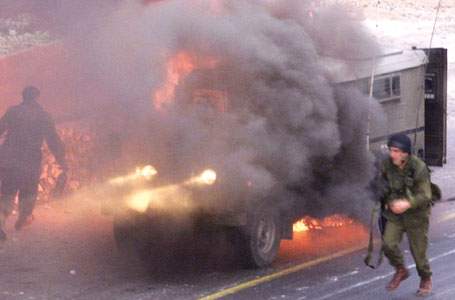
A Jeep catches fire after trying to rush a burning barricade set up by Palestinian demonstrators in Beit Ummar in November 2000. During the fighting, Ali Abu Awaad’s elder brother, Yousef, was shot and killed by an Israeli soldier. Lefteris Pitarakis / AP Photo
“We don’t have the luxury of giving up,” says Damelin of her work with Awwad. “More than ever, we have to do this, to provide an alternative message.”
The two are members of the Parents Circle, also known as the Bereaved Families Forum, a group of about 500 Palestinians and Israelis who have lost loved ones in the conflict, and who are calling for an end to the violence and vicious cycle of revenge that has blighted regional politics. Set up in 1995, the organisation is active both as a support group for bereaved families and as a campaigning force that runs several reconciliation programmes.
“When you are bereaved, the politics disappears,” says Awwad, who was a teenage resistance fighter of the first intifada and spent four years in an Israeli prison. “What unites us is pain,” he explains. “Pain is not political. Pain is not ideological. Because we took a step to meet as human beings, we are able now to sit and to discuss the most complicated political issues.”
It is a position that has secured them a public platform and, they say, enabled them to shift the most entrenched of minds. But their bereavements do not provide immunity from attack. “I’ve been told to burn in Auschwitz… called a stupid woman and told that I’ve become mental since I lost a child,” says Damelin, who ran her own PR company for about 20 years before quitting to make time for her work with the Parents Circle. Awwad says he has given talks in classrooms where settlers have wanted to throw him out; been told that his brother was a terrorist who deserved to die; and faced down accusations that, in working with Israelis, he has given up the Palestinian cause.
“It started by us both liking cigarettes, a lot!” jokes Damelin of her friendship with Awwad. At first these two members of the Parents Circle would slope off for a smoke together; they have quipped that peace could easily break out if each side of the conflict had to buy cigarettes from the other. They first met while in Italy on a speaking trip, around five years ago. “We were asked to do an interview for Vatican radio, which goes out to Catholics all over the world,” Damelin says. Awwad volunteered to speak alongside her for the programme – and that was the first time that they heard each other’s story. “The lady who was interviewing us ended up crying, I was crying, Ali was crying – the whole of Vatican radio was crying.”
Since then, the two have received many invitations to talk together – and they’ve also become firm friends. “For me, sitting there on the radio programme and hearing about [Damelin’s son] David, all I heard was a mother, not an Israeli,” says Awaad. “She told the story as a human being, and she was not defending the army or giving any excuses… it really moved me. I could see the human side of David’s story.”
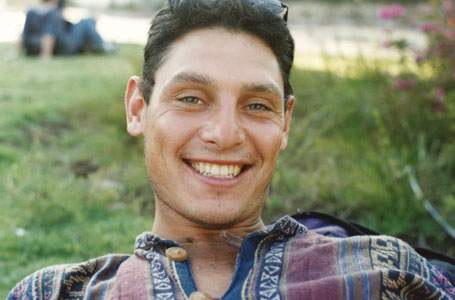
Robi Damelin's son David was killed by a Palestinian sniper. COURTESY ROBI DAMELIN
David was 28, a masters student, teacher and peace activist when he was killed by a Palestinian sniper. At the time, he was serving at a checkpoint near a settlement in the occupied West Bank – a decision that weighed heavily upon him, his mother now recalls. She describes a tall, socially attuned, committed son who was also a friend: they shared long conversations, a campaigning spirit, cooking and a love of music. Damelin, who lives in Tel Aviv, has another son and is a grandmother of three. “I miss David terribly and there are days when I can’t bear it,” she says. “But you can’t die with your child.”
Awaad’s brother Yousef left a wife and two children in Beit Ummar, near Hebron when he was killed in 2000. He was 32 years old. “We grew up as friends,” says Awaad. “He was two years older, but we shared our childhood together. He looked after me like a mother and a father; he left high school to work and to support us. He knew all my secrets and I knew his.”
Awaad recalls times when he would use his brother’s ID card to get through checkpoints and at one point picked up a driving fine – which Yousef uncomplainingly paid. “He wasn’t angry with me – not at all. He was just amazing, a beautiful guy.”
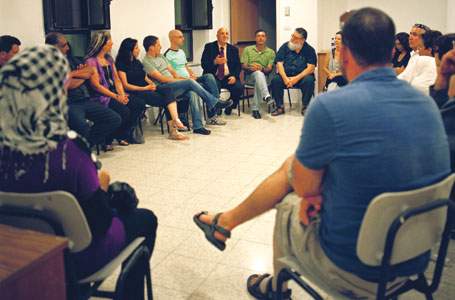
A meeting of the Parents Circle in Jerusalem’s Old City. The group has about 500 members who have lost someone in the conflict. MICHAL CHELBIN
Both of them stress that their way of doing things is by no means an easy way – and that these are not the standard, rather anodyne exchanges of what is fast becoming disparaged as a “peace industry”: various projects that talk the talk, but don’t do much beyond that. “It is not about hugs and hummus and flowers,” says Awaad. “I am fed up with peace conferences in five-star hotels.”
Damelin adds that the process of meeting the other side, on these terms, is complicated. “It takes time. It is a very difficult and long journey and it is a journey that goes through some bumps. It is not always, ‘Hello darling’, no. There are heated moments, but when you care about somebody enough… it’s a bit like family; you always forgive your brother even if he gets on your nerves sometimes.”
Immediately after the Gaza war, a time when many Palestinian-Israeli groups were strained to breaking point, the Parents Circle kept talking. “We had a seminar in February, just after the war,” says Damelin. “Some 250 of us came together to sit down and share how we were feeling and it was incredible to see that the very fact that we, of all people, could still talk together and cry and think of how to go forward.”
They explain that the shared grief makes it possible to reach a level of interaction that might not otherwise take place. And Awaad has some thoughts on why such interactions do not take place more often. “I always say, it’s not that people do not want peace and reconciliation. It is because they cannot deal with the daily pain – they don’t know where to put the anger or how to live with the suffering. And if I don’t have the empathy to understand this anger, then I don’t have a solution, either.”
For these two individuals, the pain has somehow been harnessed as an energising force. “It is our tool,” says Damelin. “I am not ashamed to say that I do use the pain, because I think that is the weapon for trying to change people. We have paid this extraordinary price – so if we can sit together, for God’s sake, is that not a good example?”
Awaad whose politically active mother was often imprisoned by Israeli forces, holds that it is a question of tactics. In shifting from being a fighter to an advocate of non-violent resistance, he says he is still serving the same Palestinian cause for freedom and statehood. He describes the non-violent approach as “the courage to employ your pain, instead of allowing it to kill your cause”. His mother and one of his brothers are also both active in the Parents Circle. “I lost my brother, but I didn’t lose my mind,” he says. “There is no end to violence as long as our lives are managed by hatred. And this competition of who is more of a victim – I do not want to be anyone’s victim or any part of that.”
Damelin who is of South African origin, talks about the processes of conciliation. “People think that reconciliation is forgiving, but that is a mistake,” she says. “Forgiving is the next step, maybe. If you look at the Truth and Reconciliation committee [in South Africa, post-apartheid], you didn’t have to forgive in order to give clemency. People just had to tell the truth.”
The shifts in her country of origin are a source of inspiration today. “If you had told me in 1967, when I came to Israel, that black and white people would be able to sit together in South Africa, I would have said you were mad,” she says. “And look what happened there – a miracle.”
She has spoken of her son David’s killer. “He saw his uncle very violently killed during the first intifada as a child, and then two of his uncles disappeared during the second intifada. So he was on a path of revenge – but he doesn’t understand that there is no such thing, that no matter how many people he kills, it won’t make him feel better.”
When the sniper Ta’er Hamad was captured, Damelin felt no solace or satisfaction. Instead, she was compelled to write a letter to his family. “I am the mother of David, who was killed by your son,” she wrote. “I know he did not kill David because he was David; if he had known him he could never have done such a thing.” She went on to describe her son as having belonged to the movement of military officers who did not want to serve in the occupied territories, but who did not refuse the order when it came. “I do not know what your reaction will be. It is a risk for me, but I believe you will understand,” the letter ended. “I hope that one day you will show this letter to your son, and that maybe in the future we can meet.”
The family didn’t pass on the letter but about a year ago, at Damelin’s request, a member of the forum who visits Palestinian prisoners did deliver it to Hamad. And a few weeks ago, the jailed sniper replied giving a direct rebuttal of her appeals and a defence of his actions as being justified by the cause of Palestinian resistance to the occupation. In his letter, Hamad made it clear that he considered David to be responsible for the torture and killing of Palestinian people – he was, according to Hamad, a legitimate target. Incredibly, Damelin’s surviving son suggested that these words might be the start of a dialogue. And a few days after seeing the letter, Damelin wrote back. “How ironic,” she wrote. “The people who most wanted to protect me from the words in your letter were my Palestinian friends and other bereaved parents in our group… The tears I saw in the eyes of my Palestinian partners in the Parents Circle when they met me after you chose to publish the letter were tears of understanding and yes, friendship and love.”
The commitment to this work and this dialogue is not without its toll. Damelin and Awaad are about to embark on another packed speaking tour that takes them through Europe and the United States. At public engagements, they are so open and human when they talk that, once they’re offstage, everybody rushes to befriend them and share stories. Asked to name the hardest part of the work, they each describe the loss of a personal life and the time for everday pursuits. “It’s a major pain, it is really tiring,” says Damelin. “But it is not work, it’s a mission – there isn’t a choice any more.”







